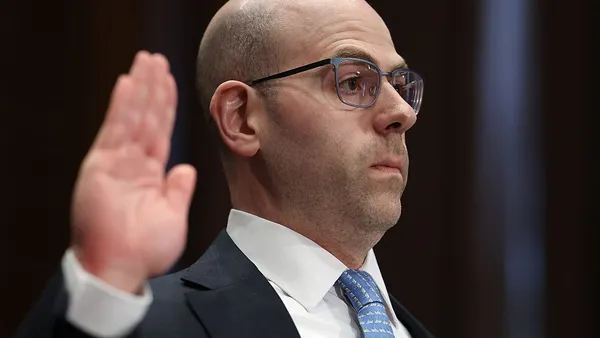The Consumer Financial Protection Bureau has freed Bank of America from a mortgage data-related consent order three years early, an administrative document shows.
The bank, which allegedly failed to collect required demographic data of mortgage applicants but blamed its lack of data on applicants choosing not to respond, paid $12 million in 2023 to settle the allegations without admitting any wrongdoing.
As part of the settlement, the CFPB was to monitor Bank of America for five years. But the CFPB terminated its agreement with the bank June 4.
“Respondent has fulfilled the obligations under the Consent Order, including, among other things, payment of a civil money penalty of $12 million, development of a compliance plan and an annual report, and implementation of improvements to its [Home Mortgage Disclosure Act] compliance management system,” CFPB Acting Director Russ Vought wrote.
Bank of America declined to comment. The CFPB did not immediately respond to a request for comment.
Terminating a CFPB consent order early is not unheard of, said Brandy Bruyere, a partner at the law firm Honigman.
“Under the first Trump administration, the CFPB issued guidance on how regulated entities could apply for early termination of consent orders,” Bruyere told Banking Dive via email. “This required meeting several conditions, including demonstrating full compliance with the underlying consent order. Overall, the policy was crafted to be rather judicious in how and when the Bureau would grant such a request.”
It is, however, different from business as usual under Biden-era CFPB Director Rohit Chopra.
“During Chopra’s tenure, the CFPB was taking aggressive action against so-called repeat offenders rather than ending enforcement oversight early,” Bruyere said.
The CFPB’s decision to terminate the Bank of America consent order marks another retreat for the agency from the CFPB decisions of yesteryear. Last month, the bureau terminated a consent order against Mississippi-based Trustmark Bank, over redlining allegations, 17 months earlier than planned.
The CFPB also amended a consent order against Wise, a fintech, related to its remittance practices. Under former Director Rohit Chopra in January, the CFPB hit Wise with a $2.025 million civil money penalty. Under Director Russ Vought, however, that penalty was reduced to $45,000 last month.
Vought has sought to reduce the CFPB’s workforce by about 90% since taking the reins under President Donald Trump. Efforts to defund the agency have come from other Republicans, including Sen. Ted Cruz, R-TX, who introduced a bill to defund it in January (and in both 2015 and 2023).
“The CFPB is an unelected, unaccountable bureaucratic agency that has imposed burdensome and harmful regulations on American businesses, banks and credit unions,” Cruz said in a prepared statement alongside his reintroduction of the bill.
Senate parliamentarian Elizabeth MacDonough thwarted another attempt to defund the CFPB last week, this time from within Trump’s One Big, Beautiful Bill. The provision that would have zeroed-out the agency’s budget, MacDonough rules, ran afoul of the Byrd Rule, which limits what can be included in reconciliation legislation.
Still, numerous changes have been made under Vought, including the rescission of 67 pieces of guidance, some dating back to 2011, in May.













